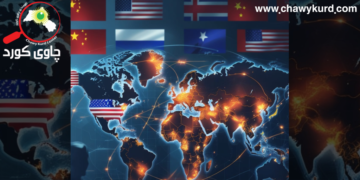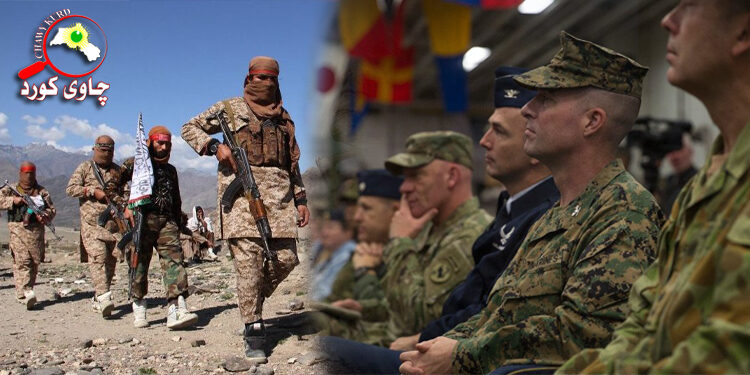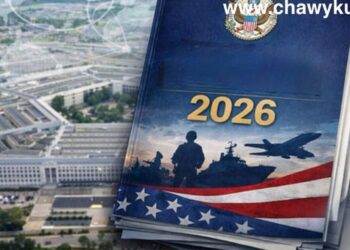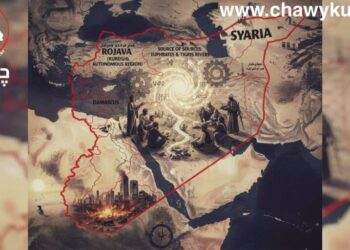The United States’ effort to strengthen the Afghan security forces has come to an ignominious end. The U.S. military spent 20 years and $83 billion building up a force that melted away in a matter of weeks, ceding the country to the Taliban over that period with barely a shot fired.
The swift collapse of the Afghan security forces is not an outlier. In fact, it is closer to the norm for local security forces built up with U.S. military assistance. The United States’ three largest efforts to build partner militaries—in Vietnam, Iraq, and now Afghanistan—have all failed spectacularly. There is good reason the images coming out of Kabul conjure up Saigon in 1975 and Mosul in 2014.
What the military calls “security force assistance,” “building partner capacity,” or “train-and-equip operations” remains a pillar of U.S. defense strategy. Setting Afghanistan and Iraq entirely aside, the United States spends billions of dollars every year and deploys thousands of personnel to train and assist foreign militaries from countries all over the world. Although the purpose of such assistance varies, its main goal is to increase the capacity of partner militaries to shoulder local security burdens so that the United States can shift its own resources to higher priorities.
The problem, however, is that the United States’ partners are often uninterested in building militaries that can fight. As Georgetown University Professor Caitlin Talmadge has shown, political and military leaders have to foster the promotion of competent officers, enforce a chain of command, encourage rigorous training, and put a lid on corruption to create an effective force. But in the weak or failed states where the United States focuses its security assistance, leaders often prioritize their personal and political survival over strengthening their nations’ militaries. These leaders often aim to use their military as a source of patronage or as a cudgel against their domestic political opponents. They may welcome the largess of U.S. military assistance, but they fear building a professional force that could threaten their own power. So they ignore the pleas of U.S. military advisers, implementing policies that keep their militaries weak.
These challenges were on full display in Afghanistan. For the duration of the U.S. advisory mission, Afghan officers proved less interested in fighting for the corrupt government in Kabul than in securing their own personal enrichment, siphoning American dollars to their patronage networks through the contracting process and shaking down the Afghan people in every interaction. Soldiers, eyes wide open to the corruption of their officers, had little interest in risking death under their command. No wonder, then, that Afghan units were undisciplined and tactically weak long before the U.S. withdrawal—and that as the United States withdrew, many decided to open the gates to the Taliban.
In Afghanistan and advisory missions across the globe, the United States relies on strategies to motivate its partners that do not work. The U.S. military prioritizes building relationships with foreign militaries over applying any sort of conditionality to its security assistance, and civilian officials in Washington defer to its approach. The United States then issues rosy reports to the American people about the progress being made by the local partner, which continue until the fateful day when the force is asked to operate on its own. And then Saigon. Mosul. And now Kabul.
PERSUADING NOBODY
The U.S. military is almost entirely responsible for the design and implementation of American security assistance programs. The other branches of the U.S. government regularly defer to it on this issue: What, after all, could fall more squarely within its purview than building other militaries? In practice, it is the U.S. military that interacts with local political and military leaders on issues related to the development of their security forces, and it is the U.S. military that develops strategies for addressing the problem of partner motivation.
The doctrine that guides U.S. military advisory missions discourages advisers from using carrots and sticks to convince local leaders to implement meritocratic personnel practices, follow a chain of command, train rigorously, and curb corruption. One U.S. military manual, for instance, explicitly discourages advisers from using “bribery or coercion, since results achieved from these actions are only temporary.” Instead, the doctrine and training prescribe a strategy based on rapport-based persuasion. U.S. military advisers are taught to prioritize their relationships with their counterparts, as “trust and confidence define how well the advisor will be able to influence the foreign security force.”
Many U.S. military advisers come to view interpersonal rapport with partners—once a tool presumed to increase influence and shape partner behavior—as the very goal of advising. When persuasion fails, advisers are instructed to avoid any steps that might jeopardize the relationship.
This strategy of rapport-based persuasion has persisted despite the fact that the United States is well positioned to wield incentives to influence its security force partners. The leaders in recipient countries are often highly dependent on the United States for their regime’s security and, in many cases, for their own physical survival—and they know it. South Vietnamese President Ngo Dinh Diem and Iraqi Prime Minister Nouri al-Maliki, both leaders whose countries were the beneficiaries of massive U.S. military assistance programs, repeatedly expressed concerns that the United States was about to overthrow them. (They were right to worry: Diem was killed in a 1963 coup that the Kennedy administration tacitly greenlighted, and Maliki resigned in 2014 after he lost the support of the Obama administration.) If acute fears that Washington might toss them out of power at any moment do not give the United States leverage at the bargaining table, it is hard to imagine what would.
BUREAUCRACY DOES ITS THING
Why does the U.S. military persist with a strategy of advising that doesn’t work? Like most large bureaucracies, it tends to institutionalize ways of doing business that serve its interests—in its case, autonomy, prestige, and access to resources. The military establishes standard operating procedures that advance its bureaucratic interests, and these SOPs tend to stick unless civilian leaders push hard for change.
Rapport-based persuasion may do little to incentivize local leaders to build better militaries, but it serves the U.S. military’s bureaucratic interests. The gentle approach maintains comity with local partners and bolsters a narrative of cooperative partnership that legitimizes the entire advisory effort. In contrast, threatening local leaders with reductions or cessations of support could disrupt the U.S. military’s own procedures and relationships. A more assertive approach to advising might also spark ugly conflagrations that call Washington’s attention to the advisory effort, increasing the risk of civilian meddling.
When viewed through the lens of organizational theory—the school of thought focusing on how wrangling among bureaucracies and bureaucratic processes shapes foreign policy—a number of problems with security assistance come into focus as symptoms of the same illness. For example, many commentators cite the short tours of military advisers as a cause of train-and-equip missions’ failure. Critics are right to point out that short tours are completely incompatible with the military’s own theory of effective advising, which hinges on interpersonal relationships. But short tours are best understood as a product of organizational logic: by keeping deployments short, the military avoids the internal pushback that proposing longer tours would certainly spark. The military is aiming to minimize bureaucratic headache and implement the standard operating procedures it can sustain, even if those procedures are untethered from its own theory of victory.
The United States’ partners are often uninterested in building militaries that can actually fight.
The U.S. military’s tendency to consistently report progress in advisory missions, despite evident dysfunction, serves similar bureaucratic purposes. By presenting a narrative of slow but steady progress, the military insulates itself against critique, intrusion, and disruption. John Sopko, the U.S. special inspector general for Afghan reconstruction, assessed that the military “knew how bad the Afghan military was” but constantly “changed the goal posts” on its progress reports to show success—and when even that failed, it classified the assessment tool. “If you had a clearance, you could find out [about the poor state of the Afghan military], but the average American, the average taxpayer, the average congressman, the average person working in the embassy wouldn’t know how bad it was.”
The skewed assessments of the advisory effort in Afghanistan are not an exception but a general rule of U.S. advisory efforts. In Iraq, the U.S. military assessments focused on metrics such as whether security forces had the equipment and personnel for which they were authorized. These reports gave the military a system to support its routine production of optimistic progress reports. Few of the advisers on the ground in Iraq, however, were under the illusion that the assessments captured the true state of the Iraqi forces. “The measures of effects [effectiveness] were coming down from Coalition, from the force up in Baghdad, were things that were irrelevant,” one former adviser said. “Like, ‘is the Iraqi Security Forces fully manned?’ I’m like, yes, it’s fully manned, it’s fully manned with militiamen.”
The parallels to Vietnam are striking. General William Westmoreland, commander of U.S. forces in Vietnam, consistently lamented the incompetence of the South Vietnamese officer corps—and yet relied on an assessment system that cited metrics such as the arrival of M16s as evidence of progress. He also explicitly prohibited U.S. advisers from using threats to withdraw their advisory teams to incentivize uncooperative Vietnamese officers after attempts to do so generated bad press in Washington. The military insulated itself from external critique, and then, as U.S. defense official Robert Komer put it in his 1972 RAND report on the war, bureaucracy did its thing.
At the end of the day, it is up to civilian leaders to direct and oversee the design and implementation of the United States’ military advisory strategy. The current norms in U.S. civil-military relations, however, mean that train-and-equip efforts follow a sad, familiar pattern. First, civilian leaders assign the Pentagon the difficult—perhaps in some cases impossible—task of building security forces in stateless nations. Then, they defer to the U.S. military in the implementation of the assistance program. As evidence mounts that the local military is failing, civilian leaders grow increasingly skeptical and frustrated, but they usually stop short of meddling in what they see as military details. Instead, they largely echo the U.S. military’s optimistic assessments of the local partner’s growing strength—until it all comes crashing down.
CAN THE U.S. LEARN ITS LESSON?
The military assistance effort in Afghanistan may be over, but efforts to build the capacity of local security partners remain a pillar of U.S. defense strategy. If the United States does not learn the lessons from the repeated failures of its advisory missions, it should not expect a different outcome in its ongoing efforts.
Scholars and practitioners have floated a variety of prescriptions that would do little to resolve the core pathologies of security force assistance. Investing more money and resources into advisory missions will do no good as long as local leaders lack interest in building effective militaries. Efforts to reduce local partners’ reliance on U.S. air support and other enablers would address just one small part of the problem, while the fundamental issue of local resolve would remain. Lengthening the tours of the advisers and attracting top-tier personnel would make little difference if those advisers continue to rely on their persuasive powers alone to cajole local leaders into strengthening their militaries.
Instead, the United States should reassess the objective of its military training programs. Depending on the nature of the threat and how it fits within the United States’ broader foreign policy, building a large, professional military may be neither feasible nor necessary. In some cases, it may be more sensible for the United States to focus on building a few effective units meant to operate with American support.
For the advisory missions it does decide to pursue in the future, the United States should abandon its overly cozy strategy and instead combine persuasion with the systematic application of incentives. For inspiration, officials can turn to one of the best case studies of this approach: the U.S. Eighth Army efforts to train South Korea’s army from 1948 to 1953.
If the United States does not learn from its repeated failures, it should not expect different outcomes.
Even after North Korea’s invasion in 1950, South Korean political and military leaders were torn between national and individual motivations in a way that weakened their military strength. But unlike the U.S. military today, the American generals and tactical advisers at the time took an assertive approach: General James Van Fleet, the commander of the U.S. Eighth Army, took direct command of the Republic of Korea (ROK) Army and threatened to reduce assistance in an effort to ensure that competent officers were promoted to key commands and that the military remained insulated from politicization. At the tactical level, U.S. military advisers of the Korean Military Advisory Group likewise sought to inspire and persuade their South Korean counterparts, but when persuasion failed they threatened to cut South Korean units off from U.S. supplies to incentivize officers to follow their direction. By 1952, hardly any South Korean army officers were promoted without the approval of the U.S. Eighth Army, and by mid-1953 the local partner was transformed into an effective fighting force.
There are always complicating factors and limitations to cross-case comparisons. The U.S. military built the Republic of Korea Army at a different time and place, and it was designed to meet a different threat than the United States faced in Afghanistan and Iraq. The U.S. military’s assertive approach in Korea was likely shaped by the fact that entire U.S. divisions faced annihilation on the frontlines if the ROK Army caved—an immediate, physical threat to American lives that would not be replicated in future wars. Although the option of direct command of entire partner militaries may now be off the table for the United States, there is plenty the U.S. military can learn from its advisory experience in Korea. In particular, it can take the lesson that it was not rapport-based persuasion alone that transformed the ROK Army but also the systematic application of incentives.
Such an approach could increase the effectiveness of some security force assistance projects. But the United States also has another option: it could scale down its train-and-equip efforts altogether. Rather than using advisory missions as the preferred option for addressing local security threats, it could instead reserve such programs for states with strong national institutions and a demonstrated interest in building better militaries. This pathway would lead to the termination of most U.S. security assistance projects, including the ongoing effort to build the Iraqi security forces.
Too often, the United States’ efforts to train and equip foreign militaries have been motivated by bureaucratic logic rather than sound strategy. The fall of Kabul exposed more than the rot within the armies the United States builds. It also exposed the rot within the United States’ approach to building them.
Foreign affairs





























































